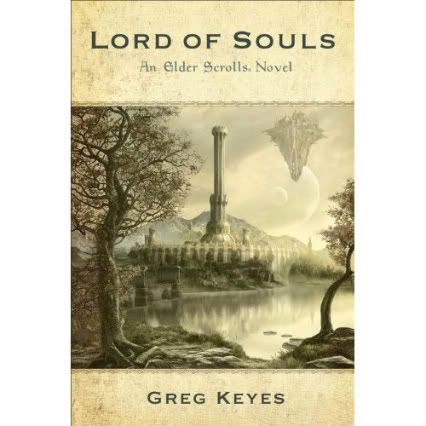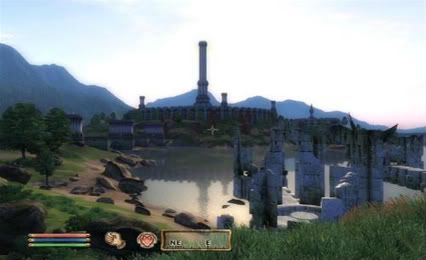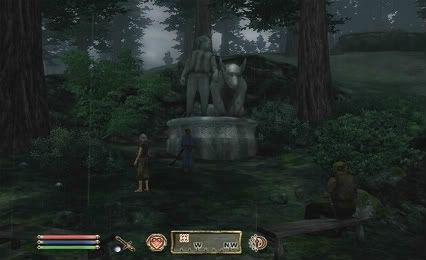
In 2009 Greg Keyes released his first book based in the Elder Scrolls universe named The Infernal City. Now this year – no doubt to coincide with the release of Skyrim – the sequel has been released, entitled Lord of Souls.
Set in the same time period as The Infernal City, Lord of Souls begins some forty years after the events players will have seen in Oblivion and around one hundred and forty before the setting of Skyrim. The story concerns the same characters as the first book also, so jumping in with this book first proved a little difficult; as minor assumptions about previous knowledge at points led to confusion for a while.
The book opens with a huge floating mass holding a city christened Umbriel making its way slowly over Tamriel towards the Imperial City. A huge undead army spawns from beneath the shadow of the floating city, and anyone killed while under it also joins the ranks of the undead. These points will all be familiar to readers of The Infernal City since it dealt with Umbriel’s first appearance, and the first attempts to stop it by the various main characters.
Broken into three parts of around a dozen or so fairly short chapters each (totalling three hundred and forty eight pages), the first part of Lord of Souls deals mainly with Annaig Hoinart and her Argonian lover Glim. They remain trapped on Umbriel with Glim working with the enslaved Skraws which keep the city running, and Annaig working for a sadistic chef named Toel in his kitchen as one of the cooks.

Perhaps it was for lack of anything else for these two to do for the first part of the story, but the book focuses far too much on a cooking contest between the main chefs of Umbriel and the pressure Annaig is under to ensure Toel wins. Eventually it becomes interesting as she does increasingly drastic things for the greater good, but prior to that reading through the demonic equivalent of Master Chef was dull and tedious. It was a dangerous way to open a book that’s meant to excite and keep your attention. She and Glim do act as the sole way to gain more knowledge about how Umbriel works and the villain behind it all, so we are not saying there is no purpose to these sections; but there could have been more interesting ways to impart that knowledge.
Inspector Colin Vineben returns and crops up here and there during the first part of the book, but the middle part is where he features most. While originally working on trying to find the Emperor’s missing son he is taken off that case to try and instead find out more about Umbriel and who was responsible for summoning the floating city in the first place. His sections are far more interesting, especially given how they begin – as intrigue, mystery and conspiracies are always fun to get your head around. We could have done without the impromptu sex scene following an assassination attempt though, still; nothing says arousal like a gutted corpse on the other side of the room.
Speaking of the missing son, Prince Attrebus and his Dark Elf companion Sul have equal page time through all three parts. Having failed to stop Umbriel in The Infernal City and nearly dying in a battle with Vuhon they awaken in the play area of a Deadric Prince saved from the brink of death. They learn that the only thing which can wound Umbriel is a legendary sword named Umbra (which players will be familiar with) which they must find before trying to get into the floating city again. From there nothing ever seems to go right for them and this makes their sections the most entertaining. It helps that Attrebus’ ignorant innocence is counterweighted by Sul’s bitter and sarcastic misanthropic attitude.

A new point of view given to the plot this time around is via Mazgar gra Yagash, an Orc whose grandfather helped close an Oblivion gate, and Brennus the Imperial mage she is assigned to bodyguard as he tries to find ways to stop Umbriel. These sections are mostly there to provide fight scenes to break up the plot as more often than not, Mazgar is fighting the undead army created by Umbriel as it spreads across Tamriel (or just running away from it with Brennus).
Lord of Souls is never hard to read and after a slow start does a smooth job of building up tension as Umbriel gets ever closer to the Imperial City. Things keep going wrong for each character trying to stop it, eventually reaching a largely satisfying conclusion as long as you aren’t expecting happy endings all around. Reading The Infernal City first is highly recommended to avoid early confusion you would get here otherwise, but even if you haven’t you can jump in at this point and eventually enjoy the ride. Fans of the level of fantasy found in any Elder Scrolls game will feel at home here though those without knowledge from any of the games may find it just a little too simplistic in comparison to the behemoths of the genre.
A sample of The Infernal City and Lord of Souls can be found at online booksellers and both have an RRP of £6.99.